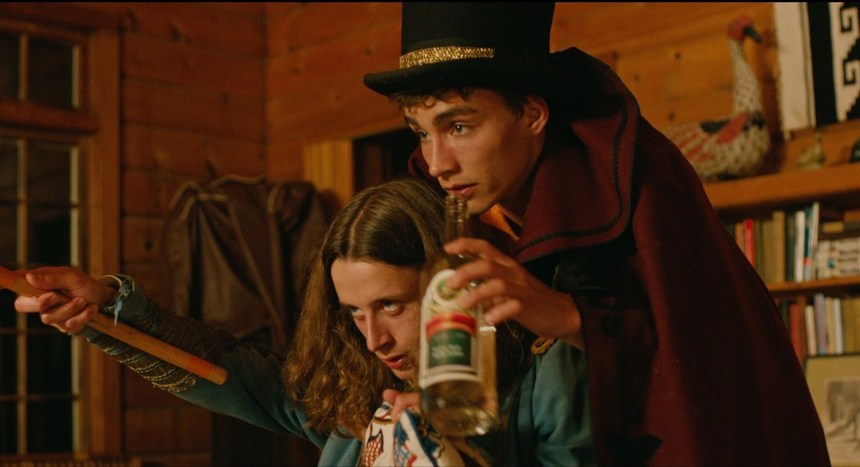Review: THE SONG OF SWAY LAKE (2017), a dream-like experience unlike any other

I’m not necessarily a big fan of artsy, slow-moving and dreamy motion pictures; most of them, instead of being honest or justifying their dream-like tone, end up being quite pretentious and empty. Thankfully, that’s not the case of Ari Gold’s “The Song of Sway Lake”. Mixing up energetic performances with a melancholy setting and a captivating story, the film manages to win over the viewer by sheer force of charm and quirkiness. But unlike many other indies, these qualities seem to come out naturally from the film’s story, instead of being forced or unlikable. “The Song of Sway Lake” is the kind of indie picture most productions want to be, but never actually manage to match.
After his father commits suicide, young Ollie (Rory Culkin) teams up with Russin heartthrob Nikolai (Robert Sheehan) to steal a priceless vinyl record from his family’s lakehouse in, you guessed it, Sway Lake. They seem to have quite some fun when they arrive —Ollie even manages to meet and girl and rapidly take a liking to her— but then Ollie’s grandmother, Charlie (Mary Beth Peli) arrives in order to prevent the youngsters from doing their deed.
The conflict between Ollie and Nikolai and Charlie is quite compelling, transforming “The Song of Sway Lake” from a potentially one-shot and excessively dreamy picture, into something a little more interesting and less pretentious. The film has a bit to say about the “good ol’ days”, feeling quite melancholy from time to time, but frequently subverting expectations by making use of flashbacks, for example, in order to show that the olden days were not necessarily better than the present. Ollie is haunted by the memory of his father —consider his frequent nightmares—, which serves as a pretty compelling motivation for his actions. He doesn’t seem to be in mourning, though; he exteriorises his pain not through emotions, but through his actions.
Rory Culkin is very good as Ollie. He transmits the relaxed nature of his character quite believably, while also conveying a sort of hidden pain that transforms him into something quite more complex than what one might initially suppose. The tension between him and Charlie is palpable, making it evident that, whenever he has to interact with her, he is out of his element; he looks uncomfortable and seems to be surprisingly vulnerable. It is a solid central performance, one that anchors the entire picture and gives it its beating heart.
Mary Beth Peli is equally impressive as Charlie, though. Despite being very harsh towards her grandson, one does get where she’s coming from —she might be the antagonist of the story, but she doesn’t feel like an archetypical mean old lady. On the contrary, her performance gives the character a little more dimension, making some of the more emotional moments between her and other characters feel much more honest and haunting. Robert Sheehan, on the other hand, is not on the same level as Peli or Culkin. Don’t get me wrong, he doesn’t give a bad performance, but his thick Russian accent is too cartoonish, and the way he portrays some of Nikolai’s actions —including skinny dipping and, in general, walking around naked whenever he has the opportunity— doesn’t feel as believable as the rest of the acting choices in the film.
Visually, “The Song of Sway Lake” is quite beautiful. The fact that it’s set in a lake town gives the movie the opportunity to use a couple of breathtaking panoramic shots, as well as scenes set during the sunset or the “magic hour”. Camerawork is fluid and contributes to the movie’s dreamlike tone, and the contrast between the flashbacks —most of which are set during the cold, harsh winter— and the warmer colours of the summer definitely helps conveying the movie’s themes regarding the nostalgia for the past. Unlike many other contemporary pictures, “The Song of Sway Lake” is not afraid of strong primary colours and, in general, a warmer, more intense colorisation, which manage to give it a style of its own.
Music is very important for the story at large. Ethan Gold’s soundtrack helps to convey the film’s central themes, and the titular track, while not necessarily surpassing the original version, feels right at home in the film. Many indie pictures tend to neglect the audio aspect of their respective stories, but in this case, it is so well utilised, that one ends up not quite imagining the movie working without this particular soundtrack. Gold knows when to use silence to convey tension, and when to use his music in order to elevate the film’s cinematography, or even the performances of his lead actors.
“The Song of Sway Lake” is a pleasant surprise, a realistic yet dreamlike drama that conveys a palpable longing for endless summers and lazy afternoons, while also considering that the way one remembers the past is not necessarily truthful or objetive. Performances are solid all across the board —Culkin and Peloi are particularly impressive— and the warm and inviting cinematography —seldom have I seen such a beautiful lake country being depicted on screen— definitely manages to turn the film into an emotional and hypnotising experience. “The Song of Sway Lake” is both predictably artsy and unlike any other indie movie I have seen in recent times, which is why any self-respected cinephile should try and see it as soon as possible.







